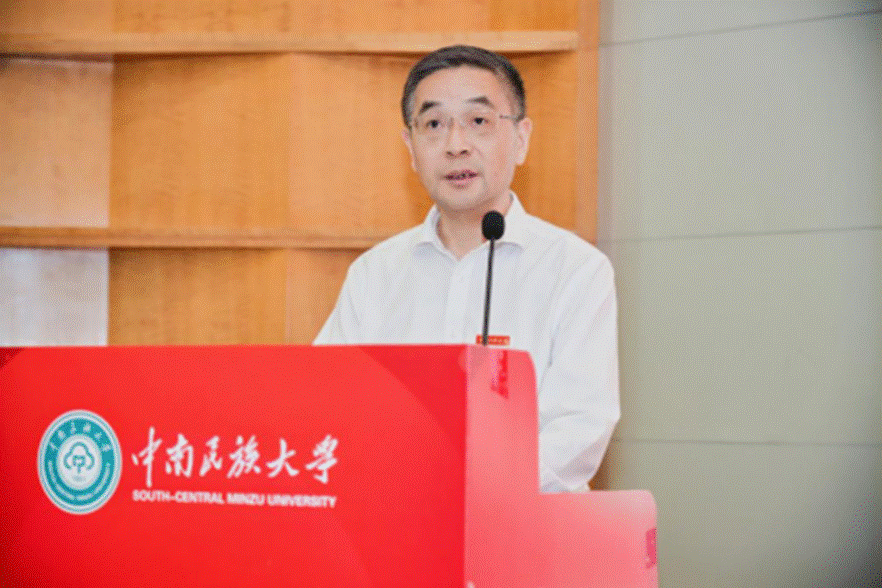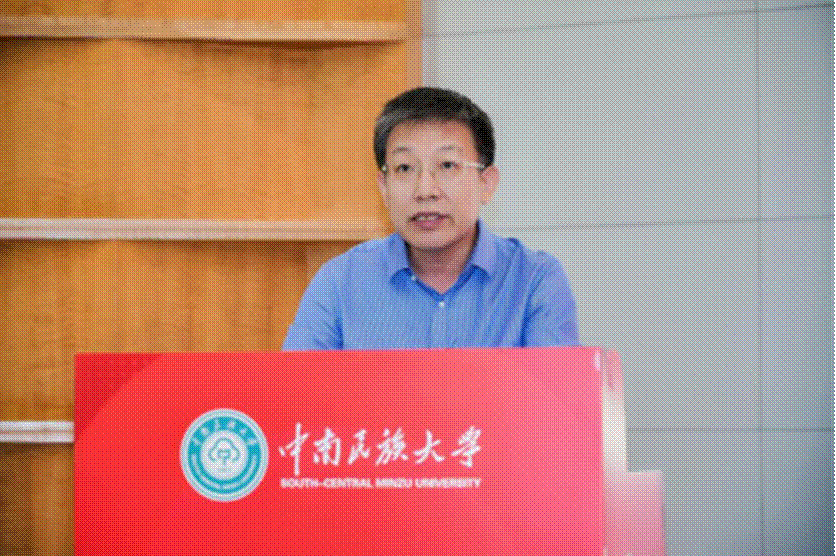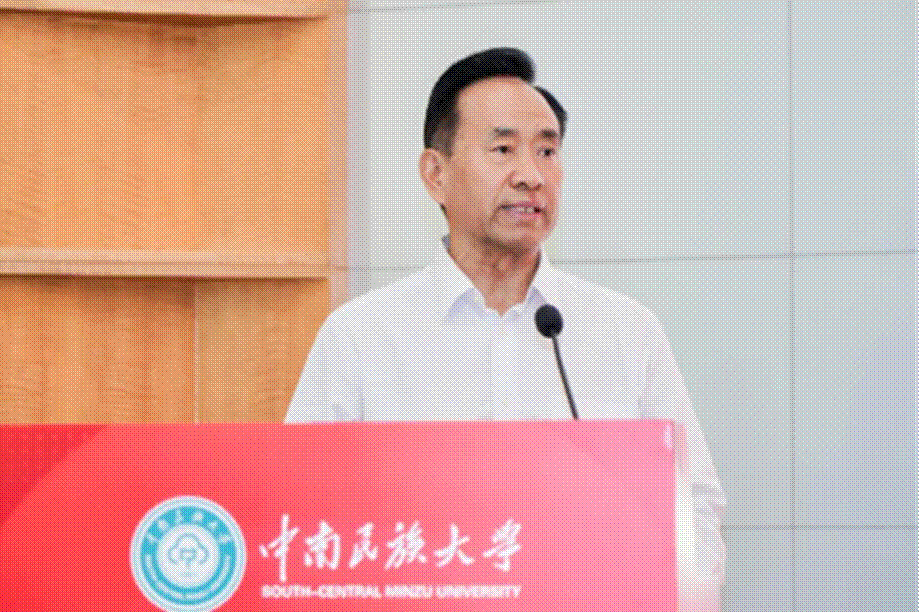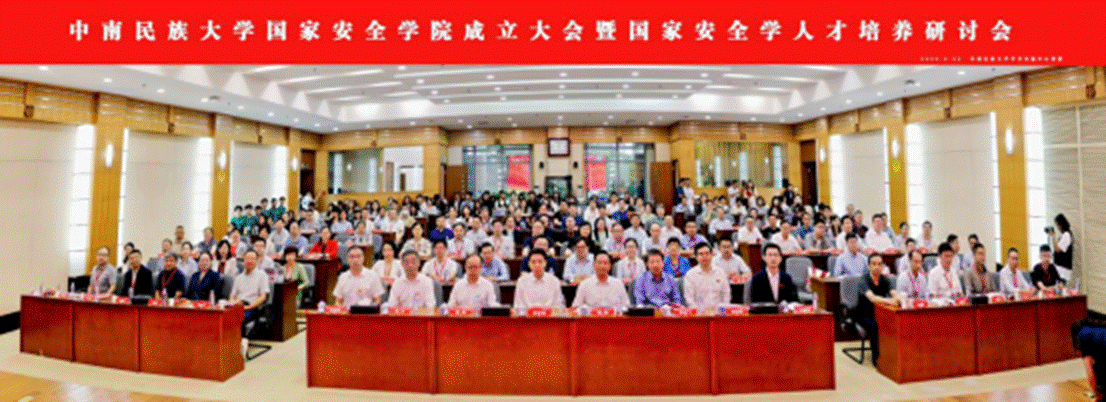On the morning of May 22, SCMU held the inauguration ceremony for its School of National Security and a symposium on national security talent cultivation at the Academic Exchange Center. University Party Committee Secretary Xu Yeqin, Party Committee Deputy Secretary and President Liu Yi, university leaders Song Fajun and Fang Debin, along with authoritative experts from over 20 universities with doctoral programs in national security studies including Tsinghua University and People’s Public Security University of China, and representatives from partner institutions and research organizations such as the University of International Relations and China Institute of Contemporary International Relations, gathered to discuss new pathways for national security discipline development and talent cultivation. Over 200 participants attended the ceremony, including leaders from various university departments and faculty and student representatives from the School of National Security. Fang Debin presided over the ceremony.
Xu Yeqin, Liu Yi, Professor Cheng Lin (convener of the National Security Studies Discipline Evaluation Group of the State Council Academic Degrees Committee and former president and party secretary of People’s Public Security University of China), Professor Shen Shifei (leader of the National Security Studies Discipline Establishment Demonstration Working Group and party secretary of Tsinghua University’s Institute of Public Safety Research), and Professor Guan Feng (member of the National School Security Education Guidance Committee and party deputy secretary and president of Wuhan Institute of Shipbuilding Technology), along with other attending guests, jointly unveiled the School of National Security.

School unveiling ceremony. Photo courtesy of School of National Security
In his remarks, Liu Yi noted that establishing the School of National Security represents opening new pathways within the university’s existing disciplinary framework. The goal is to cultivate high-quality national security professionals, promote the qualitative advancement of national security studies, build momentum toward joining the ranks of national “Double First-Class” universities, and establish the school as a nationally renowned, distinctively featured hub for national security talent cultivation, a key disciplinary platform, an important policy think tank, and a national security education and training base. He hopes faculty and students will use this opportunity to break down disciplinary barriers and cultivate first-class interdisciplinary growth centers, uphold correct educational direction under the guidance of the holistic national security concept, and continuously expand global perspectives to build new international platforms for security governance.

Liu Yi’s remarks. Photo courtesy of School of National Security
In his speech representing partner institutions, Professor Shen Shifei stated that the establishment of SCMU’s School of National Security marks both an important milestone in the university’s development and a strategic response to contemporary needs. He believes the school will fully leverage the characteristics of ethnic universities to develop unique advantages in border security theory and technology, preventing and resolving major risks in ethnic and religious fields, and resource and ecological security in ethnic regions, injecting new momentum into China’s national security in the new era.

Shen Shifei’s speech. Photo courtesy of School of National Security
Professor Cheng Lin, representing the National Security Studies Discipline Evaluation Group of the State Council Academic Degrees Committee, extended warm congratulations on the establishment of SCMU’s School of National Security. He outlined three expectations for the school’s development: first, to deeply understand the attributes and characteristics of national security studies, emphasizing the political, people-centered, comprehensive, strategic, practical, and interdisciplinary nature of discipline development; second, to highlight the ethnic characteristics and disciplinary advantages of ethnic universities by scientifically refining and precisely identifying disciplinary and professional fields; and third, to clarify cultivation goals and construct an integrated talent cultivation model of “teaching, learning, research, practice, and application”.

Cheng Lin’s speech. Photo courtesy of School of National Security
During the ceremony, Song Fajun announced the university’s documents regarding the establishment of the School of National Security and personnel appointments. School of National Security Dean Peng Qingjun provided a detailed introduction to the school's development plan. He stated that the school will focus on three major objectives: “cultivating high-quality talent, constructing a distinctive disciplinary system, and producing high-level research achievements”, adopting innovative measures to continuously enhance the disciplinary strength of national security studies and make greater contributions to safeguarding national security and promoting social development.

Inauguration ceremony scene. Photo courtesy of School of National Security
The School of National Security also hosted a symposium on national security studies talent cultivation, focusing on disciplinary system construction and talent cultivation innovation. Eight experts, including Professor Cheng Lin, Professor Shen Shifei, Professor Xiao Xi from Jilin University, Professor Li Junqing from Minzu University of China, Researcher Xu Yuhong from the Ministry of Foreign Affairs Consular Department, Professor Ma Zhenchao from People’s Public Security University of China, Professor Li Wenliang from the University of International Relations, and Professor Mao Zijun from Huazhong University of Science and Technology, delivered keynote speeches on topics including risk governance and international security talent cultivation.
The afternoon roundtable discussion focused on national security studies talent cultivation programs. Experts and scholars including Yang Huafeng (Director of Graduate Studies at the University of International Relations), Guo Yanjun (Director of the Asian Studies Institute/School of National Security Studies at China Foreign Affairs University), and Zhang Yanyu (Editor-in-Chief of “National Security Studies” at China Institute of Contemporary International Relations) engaged in discussions about SCMU’s national security studies cultivation goals, curriculum design, credit allocation, and practical teaching.